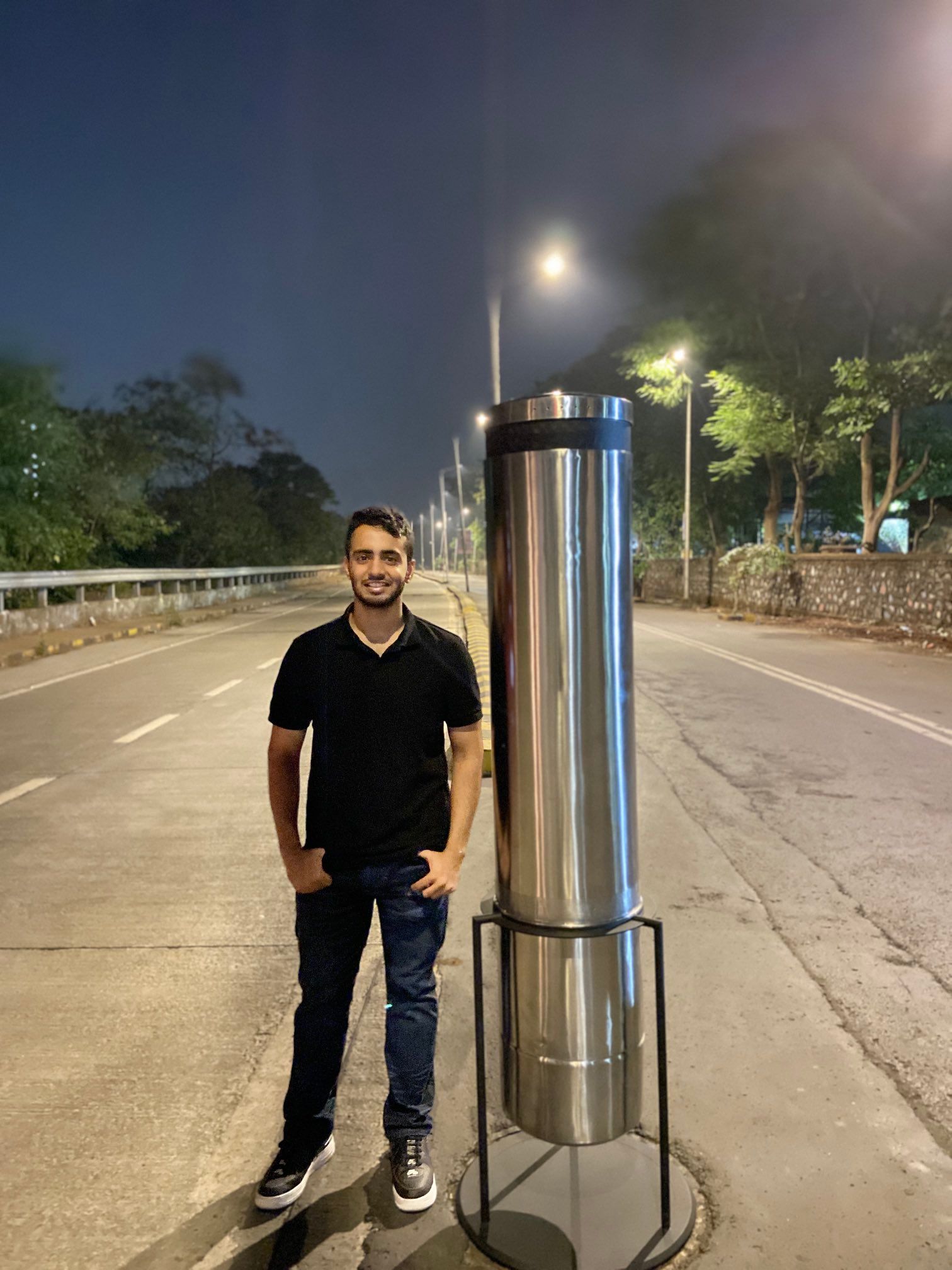“Our parents' generation grew up with the promise of an exciting future. Our generation grew up with the promise of a bleak future,” says 23-year-old Angad Daryani, Founder of clean-tech startup , on the motivation behind starting the company.
Founded in 2017, Praan provides low-cost, filter-less and artificial intelligence-based outdoor air purification systems.
Its flagship product — a six-and-a-half-foot tall cylindrical-shaped air purifier, can be placed outdoors to purify the air surrounding it.
The product
Like most purifiers with replaceable filters, the device has a fan that pulls in polluted air. Where the startup’s product differentiates itself is that it has optimised its airflow so the filtered particles settle down in a collection chamber, instead of sticking to any of the plates as is the usual case.
As this collection chamber fills up, Praan uses sensors to detect the remaining space and notifies the customer when it's filled.
“After that, it is a 30-second process. You twist it, it comes out, you empty it, and put it back in,” says Angad.
What started off as a side project in Angad’s second year of college at Georgia Institute of Technology, Atlanta, is now a company with plans to grow the team and the product.
Along the way, he got support from the community, with engineers and designers volunteering to contribute to the project.
Soon, he patented the technology and shared its credit with those who contributed. He also registered a company in the US and India to manufacture the product.

Funding
Earlier this month, Praan secured $1.56 million in funding led by Social Impact Capital, with participation from Better Capital, Paradigm Shift Capital, Avaana Capital, and Quality of Life Investments Texas (Angel Syndicate).
At the time of funding, Sarah Cone, Founder and Managing Partner at Social Impact Capital, noted, “The world sees over 70 million deaths every year due to air pollution, making it a very important challenge that requires immediate attention.”
“Praan's deeptech expertise and mission-focused attitude has been really exciting. And with this funding, we are hopeful to bring in a change in what is considered an extremely nuanced problem with a tremendous impact,” she added.
Several angel investors, including Maulik Majmudar, Chief Medical Officer of Biofourmis; Surya Panditi of EnelX; Ritesh Malik, Founder of Innov8; Akshay Singhal, Founder and CEO of Log9 Materials; and Mehul Shah, Director of DSP Design Architects, and others, were also part of this funding round.
The working
Praan initially wished to place 20-feet tall air-purifying cylinders every few feet on the streets, but realised the scale of the challenges that came around its infrastructure requirements.
Angad noted that this would have involved a lot of government level participation, “which was an uphill battle.”
So, instead, Angad adds, “We thought: can we build something that needs no new infrastructure and requires near zero maintenance?”
Most air purifiers use replaceable filters, which adds to the cost and maintenance efforts. The brand’s patent was in filter-less technology, which is what it went ahead with for production.
“We remove pollution from the air without any replaceable filters. So there is no maintenance cost in owning these devices,” says Angad. “Our mission is clean air for all. Our hardware has to be low cost.”
“If Indians can secure a global mindset and investments and build with that thought process, the country will be a great platform for change,” he adds.
Praan deployed its first product in India in June 2019. Over time, it kept on improving it with better manufacturing quality and research, thereby improving its reliability.
“And so over time, our fight needed to look exciting, because you're putting these devices where nothing was there earlier,” says Angad, adding, “So, it has to be something really good to look at, something that excites you, and that you're proud to have it where you live.”
The California and Mumbai-based startup has partnered with three manufacturing companies to make it's MK One product–the first version in India.
The filter, made of stainless steel, has a span of five to seven years and can withstand all weather conditions.
Based on air quality changes, the device optimises its performance. It will suck in more air if there's a greater concentration of pollutants. The fan speed will also increase, thereby increasing the charging of the particulates. When the air quality improves, they will turn off automatically to conserve power.
Moving forward
A majority of Praan’s products are manufactured in Maharashtra and Gujarat, and the rest, which contain semiconductors and sensors, come from China and Taiwan.
As of now, Praan is on the eighth or ninth version of its product. The device needs relatively lesser energy to function, and can run on solar energy.
The startup has found companies with industrial sites and schools as its initial big customers.
Some manufacturing companies have issues with air quality and are working with Praan and using its product. These companies can remotely control the devices from a central command centre.
“We've started site evaluations at these sites across India. And hopefully this quarter, we'll see more deployments as and when the supply chain permits,” Angad said.
Praan leases the hardware to its customers for a fixed amount per month per device and covers the whole area based on the size of the factory or the property.
It strategically places these devices in locations, considering the architecture of the street, pollution dynamics, and airflow. It also has a data platform to solve the problem street-by-street.
“We have a process where we study the site and the pollution dynamics, we are able to analyse it in software, place our devices in the software as we place them in the real world, understand the impact, optimise it, and then install our hardware in the real world,” says Angad.
“I'll know how many devices to place and where, before I even purchase raw material to get it made,” he adds.
As for the future, Angad plans to build and expand the company’s 10-member India team.
The startup also wants to take the patent-pending core technology to real large-scale pilots through B2B deployments and stabilise manufacturing. It also plans to build its piloted Direct Air CO2 Capture devices.
Edited by Kanishk Singh


